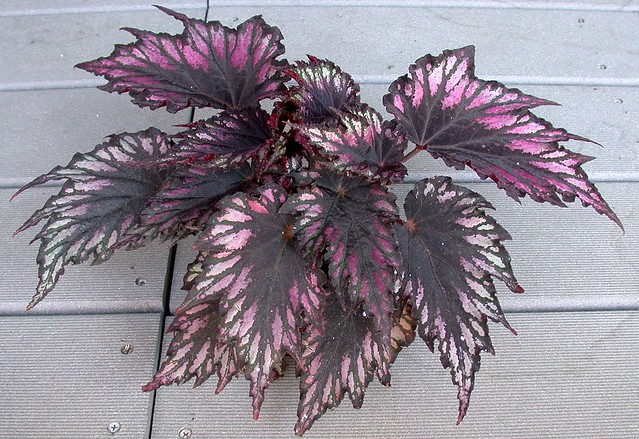
Begonia 'Helen Teupel', sold unlabeled
In an online begonia group that I frequent, not a day goes by that somebody doesn't post one or more photos of begonias they got from a friend, or purchased without any label, asking "what is it?" These are often rex hybrids, one of the groups I most often see offered without any names in garden centers. There's something about rex begonias that seduces people into buying them, but there's apparently also something about them that makes people lose their names.
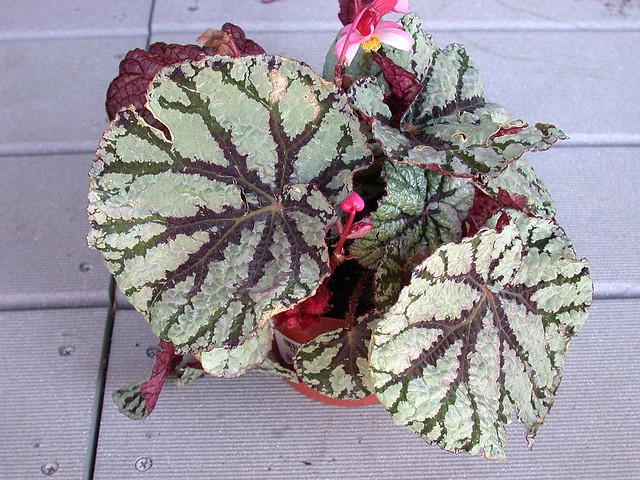
Begonia 'Fedor', purchased labeled
Recently, somebody posted a photo of one such no-name rex hybrid in that group asking, "is this 'Fedor'?" I'm familiar with 'Fedor', a recently introduced cultivar, as I had purchased one--with a label--at a local garden center earlier this year. The plant in their photo did look like 'Fedor' but there are hundreds (if not thousands) of rex hybrids in circulation. Many of them are very similar to each other, and there are few that can be identified with confidence from a photo. Far too many of them are sold and shared unlabeled. Has 'Fedor' already joined this group of no-name begonias? It's unfortunate so many growers (both commercial & hobbyists) place so little value on cultivar names when they purchase, propagate, and share or sell plants.
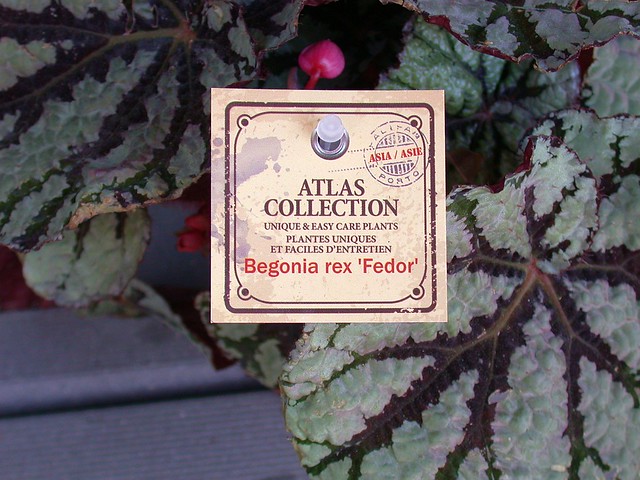
This is how you know what you're growing: Begonia 'Fedor' as labeled in garden center
A few weeks ago, while visiting the Philadelphia Flower Show, I committed the same sin of purchasing an unlabeled begonia, but only because I recognized it: 'Helen Teupel' is a very distinctive cultivar and one of very few I can reliably identify. At best, I have to tell people who ask about a no-name begonia, "it could be such-and-such, or maybe so-and-so, but it's hard to be sure". More often my reply is, "beats the heck out of me." What I don't want is somebody putting a name on their plant as a guess or as a misidentification, because passing plants around under the wrong name is even worse than passing them around without any at all. I have no desire to add to the confusion that already surrounds this group.

Begonia 'Helen Teupel' among labeled and unlabeled rex hybrids
Most of the experts, who know far more about begonias than I do, are similarly cautious about identifying plants from photos. Not only are there many look-alike or very similar cultivars, but begonias in general, and the rex hybrids in particular, tend to be extremely variable. The leaf colors and patterns can vary widely on the same plant, depending both upon their maturity and cultural conditions like light and temperature (see Begonias and temperature). For example, 'Helen Teupel' can vary from having silvery markings to having deep purple-red markings, or anything in between, including a combination of the two.
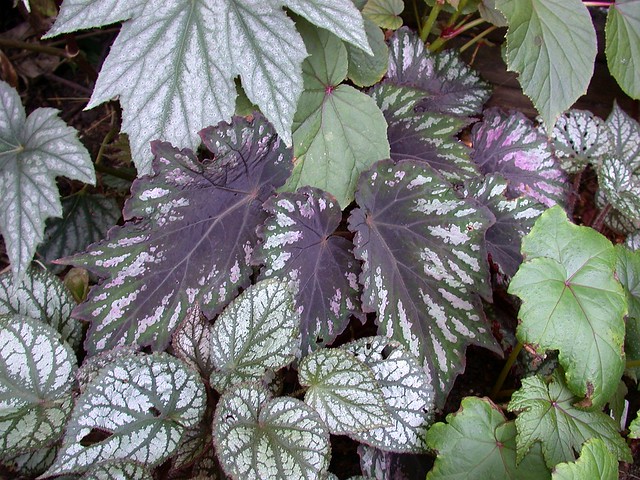
B. 'Helen Teupel' in the garden
I recognize 'Helen Teupel' because, many years ago, I purchased one that was labeled by a reputable grower. I still have that plant, out in my garden, where it has survived at least 2 winters (I'm still waiting to see if it reappears this year). 'Helen Teupel' is a fantastic older hybrid, dating to the 1920's, and there's nothing else quite like it. But if I hadn't grown it myself, and experienced its variability under different cultural conditions, I probably wouldn't recognize it among all the unlabeled plants.

Begonia 'Helen Teupel' grown in intense light
I certainly understand how easy it is to buy unlabeled plants. Several years ago, before I was really "into" begonias, I picked up a no-name rex hybrid on a whim at a local garden center. I bought it purely for aesthetic purposes, intending to pair its bold, bright silvery foliage with the fine-textured bright green foliage of a maidenhair fern. It was a good pairing, and the begonia did quite well through our summer heat (a feat for many begonias), but I neglected to take cuttings in the fall. Without a name, how do I get another one if I want to grow it again? How do I recommend it to anybody?
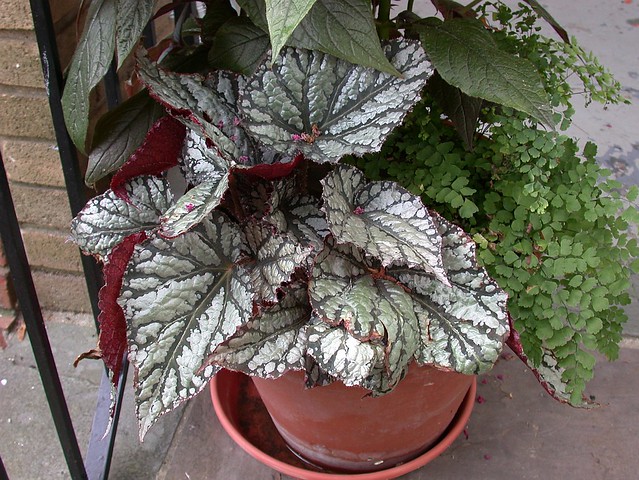
Unnamed rex hybrid, possibly 'Fairy'
When I posted a photo in an online group, somebody tentatively identified my plant as B. 'Fairy', but who knows. Since then, I've gotten a lot more selective about begonias and will nearly always demand a name. Now that I've grown a reliably labeled 'Fairy'--like 'Helen Teupel' one of the great older rex hybrids--I still can't be sure it's the same thing from my old photos. One thing I've discovered in growing 'Fairy' is that the silver turns red-purple when grown in intense light. If I hadn't experienced my plant showing both colorations under different conditions, I would never have guessed they were both the same cultivar.

Begonia 'Fairy', sold labeled as such
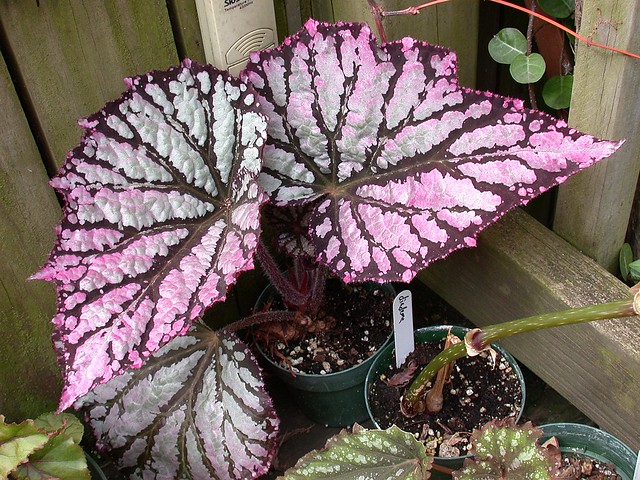
Begonia 'Fairy': same plant a few weeks later, after receiving more intense light
Why do so many of these plants lose their names? Part of the problem is that they're so easy to propagate, and get shared and passed around among hobbyists as leaf cuttings, often with minimal labeling or none at all. Part of the problem is that they are such compelling plants, selling themselves with their own beauty, labels be damned. And part of the problem--I would say the biggest part--is simple carelessness, accompanied by a devaluation of plant names in general. Outside the begonia hobbyist groups, most gardeners seem content to buy pretty plants and just don't care about their names. It doesn't help that the same plant can often be offered under 2 (or more!) names; for example, B. 'Gryphon' (often incorrectly called a "rex begonia" but from another group of species entirely) is being marketed under the trademarked name 'Pegasus' by Proven Winners.
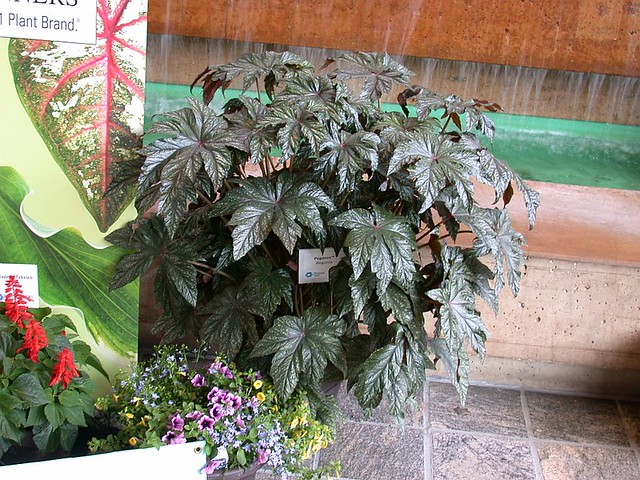
B. 'Gryphon', marketed as 'Pegasus' by Proven Winners
Plants sold with names tend to be more expensive, because it takes time, effort, expertise, and a certain amount of record-keeping to propagate and sell labeled plants. This raises one final complication: some plants are patented, including some rex hybrids. For example, 'Fedor' is a patented plant, and as such any unauthorized propagation is prohibited. Similarly, it's illegal to sell plants with a trademarked name without permission from the trademark holder (but see this great article by Dennis Carey and Tony Avent about the (mis)use of trademark names as substitutes for cultivar names). Assuming the no-name begonia mentioned above was truly 'Fedor', this may explain the lack of a name. This is one of the downsides of patenting plants or trademarking names, especially with such easily propagated plants as begonias: there's little incentive to keep the name on the plant, when propagating it without a name means less risk of getting caught evading the licensing requirements!

Buying begonias from Palm Hammock Orchid Estate, all diligently labeled
There's a reason we assign names to things: it facilitates communication. I want to be able to recommend begonias to people, and that requires names. And sometimes I want to find a plant somebody else recommended, or find a plant I grew years before and would like to grow again. Some rex hybrids, like 'Helen Teupel', are easier to grow and it's nice to be able to communicate that.

Begonia purchases from Behnke Nursery (l-r, 'Bolero', 'Salsa', 'Fedor')
As a plant breeder, I want to know the names and parentage of the plants I use, and may seek out certain cultivars because of the species in their background. For example, 'Fairy' and 'Helen Teupel' are both B. diadema hybrids, and this is a species whose genes I want in my hybrids. I know from the patent application the precise parentage of 'Fedor': 'Volcano' x U288. (This one did take a bit of detective work, though: "U288" is clearly an error for "U388", the number assigned by the American Begonia Society to a then-unidentified plant now known as B. sizemoreae.)
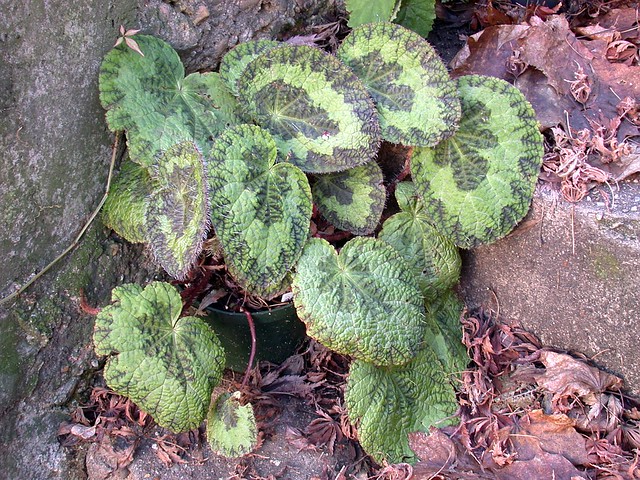
Begonia sizemoreae, one of the parents of 'Fedor'
Finally, as a plant breeder, I would also note that passing plants around without names does a great disservice to the breeders whose time and effort went into creating those plants in the first place. As an amateur plant breeder, the recognition from the plants I create and name is the only "payment" I will likely ever see! I wrote about this topic a year ago (see Credit where credit is due) and as I prepare to name and release some of my first begonia hybrids, I feel even more strongly about it now.
It's easy to say we need to demand that growers offer begonias with names, and it's easy to tell people to support only reputable growers, and to purchase only those plants that are labeled. More easily said than done! So how do we get growers, both amateur and professional, to value cultivar names more?

By educating as many consumers as possible to value and even insist only on buying plants with names. It's very satisfying to know the exact ID of the plant you have, to be able to observe it's behaviour and pin them to the right name which will help gain further knowledge about its requirements.
ReplyDeleteThis is VERY important to emphasize. Look at the disaster surrounding Trachycarpus takil in the US and Canada.
DeleteIts impossible to order a T.T. in the US without getting a T Wagnerianus or most likely a "nainital", thanks to mislableling T Fortunei nainital seeds as "true Takil" or "Kumaon". I've all but given up on finding Trachycarpus Takils or their seeds.
Europe gets it all right, but wont ship to US . This is the case with most Euro dealers due to US laws and "certain paperwork".
Thankfully Begonias grow fast and you wont have to wait 5 years to discover the plant you bought isn't the species you wanted.
Worked as a plant propagator for 2.5 years 2+ decades ago. The owner, elderly man, propagated his beloved begonia collection to sell. They sold well, no names of course. They went back generations in his family.
ReplyDeleteHis son managed the nursery/florist, and inherited. His dad called me into the office one afternoon, told me to sit, and proceeded to take ancient articles/booklets out of a brown paper grocery sack from a chain long shuttered. He spent about 2 hours with me going thru the materials, a wide mix of his lifetime of saving. He gave it all to me.
Doubt the fully realized what that meant.
His heart knew to give it to someone that it would matter to.
Garden & Be Well, XOT
In my area, the great unlabelled are succulents; I often joke that the genus is Succulent and the species is "assorted", which is how they are most often labelled.
ReplyDeleteThe internet has been a godsend as far as IDing plants goes.